Archived Blog Posts
Where Should I Install Smoke Alarms in My Home?
1/18/2023 (Permalink)
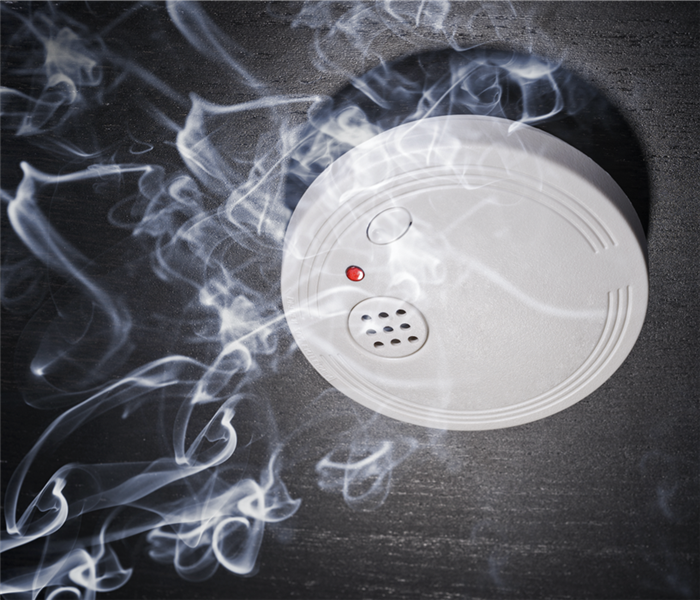 Smoke alarms are a great way to keep your home safe from fire. But, it's important that you know where they should and shouldn't be installed.
Smoke alarms are a great way to keep your home safe from fire. But, it's important that you know where they should and shouldn't be installed.
A fire can be dangerous and deadly, but also preventable. One of the best ways to do this is by making sure your home has smoke alarms installed in strategic locations throughout the house. If you aren't sure where these locations are, or if you aren't sure how many smoke detectors you need, read on to find out more about both topics!
How many smoke detectors are necessary for a home?
The National Fire Protection Association (NFPA) recommends installing smoke alarms on each floor of the house, as well as one smoke alarm in each bedroom. To determine how many smoke detectors you need, you'll need to know how many floors and bedrooms are in your home.
Where are the smoke alarms supposed to be installed?
Smoke alarms are to be installed in every room of your home, as well as near any heat source. This includes fireplaces and space heaters. They should also be placed on each level of a multi-story home, and in any area where people sleep (like bedrooms).
FEMA recommends that you have at least one smoke alarm for every 50 square feet of living space in your home. If you live in a large house with multiple floors, that number goes up to 100 square feet per alarm.
You should also make sure they're easy to reach from anywhere in the house—so don't put them behind closed doors or cabinets!
What locations shouldn't have smoke alarms?
You should not install a smoke alarm in any room, closet, or area of your house that has insufficient air circulation. Areas without adequate ventilation are known as "dead airspaces." These can include bathrooms and attics.
Another important location for your smoke alarms is not within 300 millimeters of a wall-ceiling corner, as this may interfere with the signal strength of your smoke detector. You also want to keep them a few feet away from any high-energy appliances like stoves or ovens, because the heat emitted by these appliances could cause false alarms.
How can you make sure your smoke alarm is working properly?
To test your smoke alarm, you'll need to remove its cover. Pressing the test button should cause it to emit a shrill beeping sound and show a green light on its face. If this doesn't happen, replace the batteries with new ones (or with rechargeable ones if you have those).
Make your home as safe as possible from fire.
With the introduction of smoke alarms, thousands of lives have been saved from fires every year. Smoke alarms are required by law in most jurisdictions and are relatively inexpensive. They can be installed easily but should be replaced every few years due to their limited lifespan. The best time for you to install a new smoke alarm is right now!
Smoke alarms are a great way to keep your home safe from fire. But, it's important that you know where they should be installed and where they shouldn't be installed. You should also make sure that they're working properly by testing them regularly and replacing batteries on a regular basis as well.
3 Ways To Prepare Your Home for Winter Weather
12/9/2022 (Permalink)
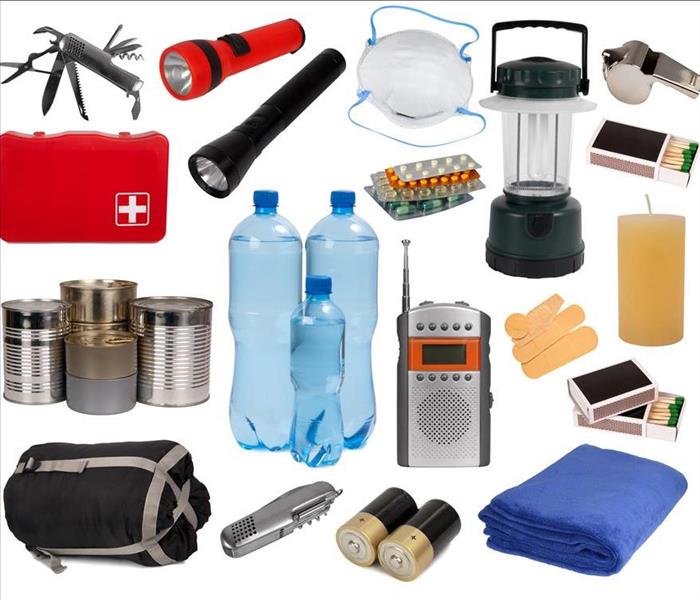 Stock up on emergency supplies
Stock up on emergency supplies
Preparing Your Home For Cold Weather
Winter is here, and it's never too early to prepare for the season. While you can't always control the weather, you can take steps to make sure that your home is safe during this time of year. Here are three steps you can take to make sure your home is prepared for the colder weather coming your way.
Winterize Your Home
Get a professional to inspect and make repairs to your furnace, water pipes and windows before winter. Seal cracks with caulk or foam insulation around doors and windows to prevent cold air from seeping in. Check the condition of your roof for leaks or damaged shingles that could cause problems if snow accumulates on them. Repair any issues before it snows heavily this season, so you'll be protected during the worst of winter's weather conditions.
Inspect Your Heating System
The first thing to do is to make sure your heating system is in good repair. Some of the things you should check include:
- The furnace, boiler and water heater all being clean and in working order.
- The thermostat is set properly for the current weather conditions by a professional HVAC technician. If it works well, you'll stay comfortable without wasting energy or money!
- Filters are clean and working properly on each air conditioner or furnace unit in the home (including window units). Cleaning them will help keep them from getting clogged with dust and dirt that could cause damage later on.
Stock up on Emergency Supplies
It’s best not to wait until the last minute when snow is fast and furious, so prep your home now. Make sure you have food, water and medicine. Store enough food to last at least three days. Keep non-perishable items in an open area of your kitchen or pantry (not your refrigerator) so they don’t lose their nutritional value if temps drop below 40 degrees F. Water is another must-have—you may need several gallons per person per day, which means more than one jugs Make sure you rotate expired items so nothing goes bad.
You will also need to make sure you have flashlights and batteries. It's always a good idea to keep plenty of flashlights around in case of a power outage (especially if you live in an area where storms can knock out electricity for days). Batteries are also essential for phones, radios and other electronics—and make sure you get fresh ones every chance you get! You might want to invest in rechargeable batteries as well; otherwise it'll be tough keeping them all charged up when the weather doesn't cooperate!
Finally, you want to make sure you have warm clothes and blankets. If recent history has taught us anything about winter storms, it's that they can bring unexpected drops in temperature while making roads slick with ice or snow - so make sure everyone has warm clothing before anything bad happens out there! Blankets are also critical since blankets help retain body heat during cold spells - especially true if it gets really cold outside overnight due to lack thereof heat inside buildings like ours here at home base. So get prepared early by stocking up now on those essentials before Mother Nature strikes again this year!
Being prepared for the first winter storm before it hits is imperative for protecting yourself, your family, and your home. Give SERVPRO of Beaufort County, Hilton Head, Bluffton, Jasper a call if you experience storm damage to your home, and we will get your Bluffton, SC home back to normal.
3 Steps for Safely Handling a Flooded Basement
12/1/2022 (Permalink)
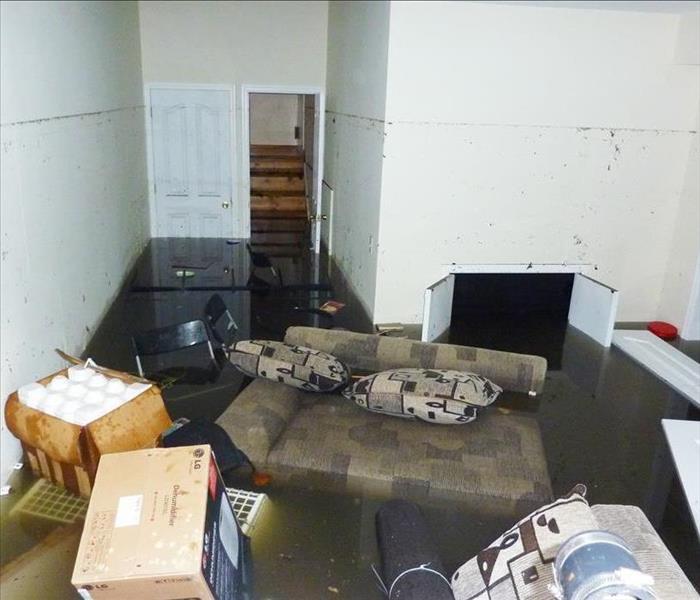 A flood in your home can be devastating.
A flood in your home can be devastating.
How To Handle a Flooded Basement
Whether your flooded basement is the result of torrential rain, a broken dam, or melting winter snows, the result is almost always the same: unwanted standing water. Here are three steps for safely handling your basement flood.
1. Switch Off the Utilities
Turning off the electricity or gas to your home may be a problem if your home’s breaker box or meter is in the basement. If so, contact the utility companies and request they turn the power and gas off. Turning the utilities off before you begin any cleanup effort can help ensure your work environment is a safe one.
2. Locate a Professional Team
Many people panic when they find their Beaufort City, SC, basement floor flooded with water. The loss of stored items, children’s bedrooms, or an extra living area with all the sundry additional items those rooms entail, can be upsetting. Calling in a professional water mitigation team can help you make sure your damaged basement has insurance coverage because the professionals often document everything they do. They can also help save as many of the basement floodwater-damaged items as possible because the knowledgeable team can help you tell the difference between what can be saved and what should probably be thrown away.
3. Remove the Standing Water
The first thing the water damage team will typically do is remove the standing water and investigate for signs of structural damage. Water removal is important because standing water can:
- Encourage mold growth
- Cause foundation damage
- Ruin walls and insulation
Once the water is gone, the team can begin cleaning and disinfecting the area, and, if needed, technicians can generally begin rebuilding the damaged areas.
A flood in your home can be devastating. Don’t let it paralyze you; instead, take the above three steps to help minimize the damage of any basement flood. You can fight back when you have a professional water mitigation team on your side.
Is There a Noise Coming From Your Water Heater?
11/12/2022 (Permalink)
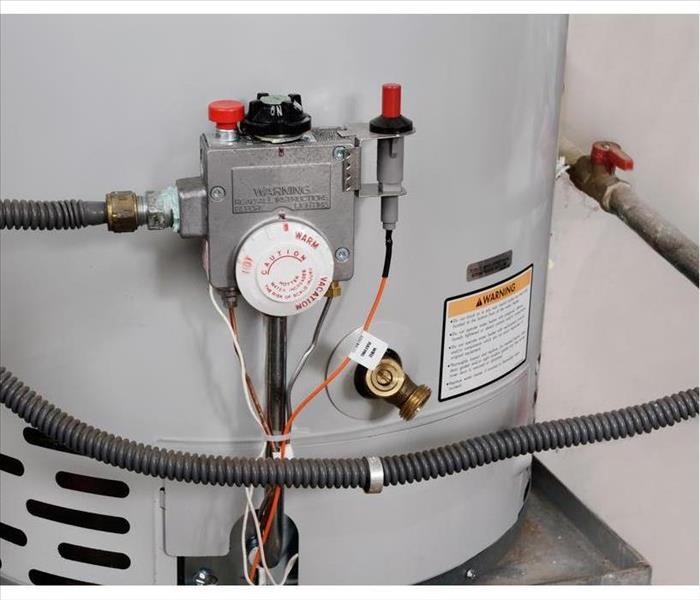 It might be time to call a plumber if your water heater is making strange noises.
It might be time to call a plumber if your water heater is making strange noises.
Is Your Water Heater Making Any Noise?
Water heaters are a staple of the home, and they can be used for decades if properly maintained. Most water heaters are installed when a house is built or remodeled, so it's likely that your home has an older model. Over time, these appliances develop quirks and become less energy efficient. The good news is that if you have an older water heater in need of repairs or replacement, it's not as expensive as you might think!
Is your water heater making noises?
- Is your water heater making noises?
- When it heats, does the water heater make a loud noise?
- When it cools down, does the water heater make a loud noise?
- Does your drain valve open and close with a loud bang when flushing out sediment or other debris that has accumulated inside of it?
Troubleshoot common issues and learn how to repair a water heater
The thermostat is one of the most common causes of water heater noise. A defective or mis-adjusted thermostat can cause the water heater to heat unnecessarily, and this excessive heating causes vibrations that can be heard as clicking or knocking sounds. If you suspect your hot water heater's thermostat is causing excessive vibration, check it for proper operation.
The pressure relief valve should never make any loud noises when heating cycle is complete, but if it does, there are a few possible causes. The gas pilot light may have been accidentally turned off while no one was home or while they were away on vacation; it's important to turn this back on before doing anything else because otherwise the pilot light will go out and leave you without heat in your house until someone remembers to relight it again!
If there are any cracks or leaks in the tank itself—or if its seams aren't tight enough together—water will seep out during periods where usage is high (i.e., morning showers), causing excess pressure inside which could potentially damage wiring components within if left unchecked long enough; resulting from these problems might include hearing strange noises coming from your system when trying something like turning on an appliance like a dishwasher (which uses lots of cold water).
Sediment or debris can cause unusual noise
When sediment builds up in your water heater, it can cause a lot of noise during its operation. This is because the sediment will rub against the inside of your water heater as it heats up and cools down. If you hear unusual noises coming from your hot water heater, there's a good chance that some debris has built up at the bottom of your unit.
The best way to deal with this problem is flush out your water heater or to call a professional plumber who can clean out any debris that may be causing trouble within your system. It isn't dangerous, but it could be causing damage if left unchecked!
If you hear odd sounds from your water heater, it may be time to call a plumber. They can help you troubleshoot the problem and get your water heater back up and running as soon as possible.
Common Problems To Combat With Commercial Water Damage
11/1/2022 (Permalink)
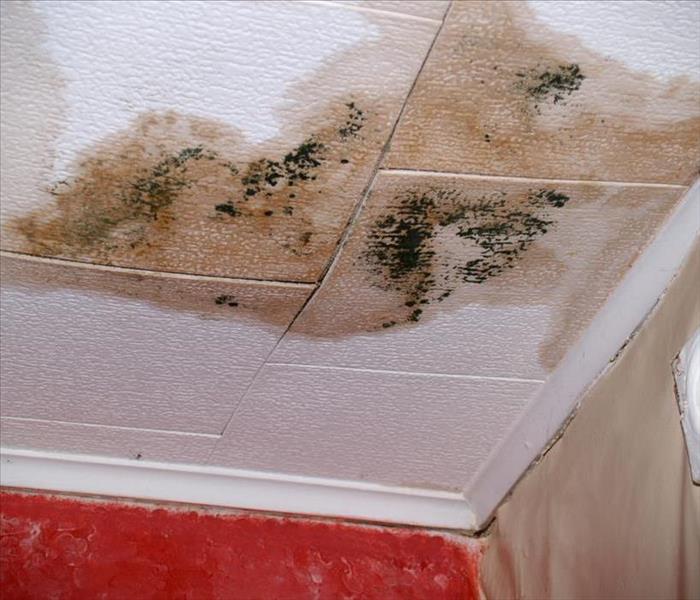 Your building is vulnerable to water damage in many areas.
Your building is vulnerable to water damage in many areas.
Commercial Water Damage
Commercial properties often face more costly water damage repairs because of the equipment on the property as well as the size and complexity of most commercial facilities. Whether you’re dealing with a broken pipe, storm damage or any other source of water issues, you should understand the importance of quick remediation. Here are the most common problems associated with commercial water damage in Bluffton, SC.
Structural Damage From Water Penetration
Whether excess water occurs from supply line breaks or broken pipes, the most common problem experienced from commercial water penetration is structural damage. Your building is vulnerable to water damage in many areas. The areas most commonly affected include:
- Drywall
- Roofing
- Flooring
- Foundation
The sooner you respond to a broken pipe, toilet overflow or any other source of water penetration, the less time water has to penetrate, reducing the structural damage effects.
Equipment Loss From Flooding Damage
One thing that sets commercial property water damage apart from residential damage is the equipment loss factor. Most businesses have capital equipment investments that are also susceptible to damage from water penetration.
Any water damage that your equipment suffers can lead to catastrophic failure. Some of this equipment may be difficult to replace if it is custom-designed for your business or in limited supply, which can affect ongoing operations.
Business Interruption From Water Damage
One water damage problem that many business owners overlook is business interruption. After a broken pipe, activated fire sprinklers or any other water disaster, you may have to close your business while repairs are completed. Depending on how long water damage repairs take, this period may have a marked effect on your company’s performance.
The sooner you address water damage problems, the less time that water has to wreak havoc on your commercial building. Doing so in a timely fashion minimizes damage effects and repair time, making water repair easier to accomplish.
The Role of Business Interruption Insurance
10/25/2022 (Permalink)
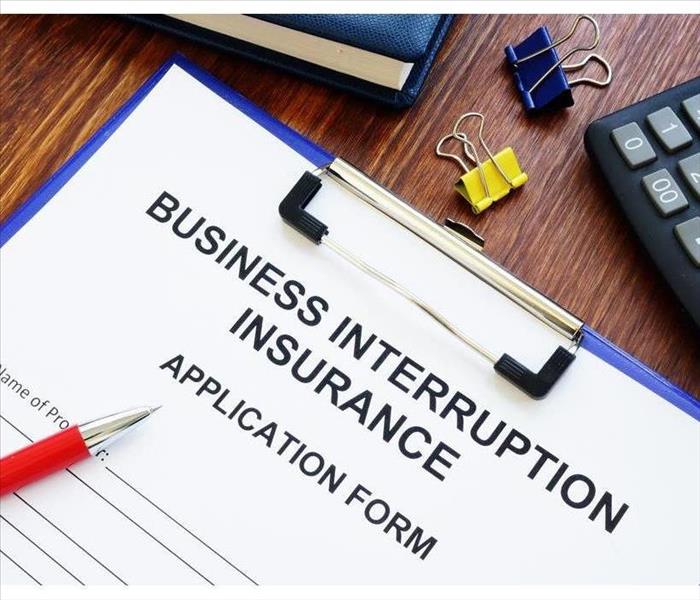 Business interruption insurance (BI) can help you recover lost income after a disaster.
Business interruption insurance (BI) can help you recover lost income after a disaster.
What Is the Function of Business Interruption Insurance?
Every business owner in Beaufort County has nightmares about their operations being interrupted by a disaster. The reality is that the likelihood of an interruption is far greater than most people would like to admit. Events such as fire, flood, and storm can not only damage or destroy your property but also disrupt your operations and cause millions in losses.
Business Interruption insurance provides coverage for lost income when you are unable to operate due to a covered event. For example, if you own a manufacturing plant in Florida which has suffered significant storm damage and cannot resume operations for 12 months; your business interruption insurance will cover the costs of renting space elsewhere while your building is being rebuilt or repaired.
What is business interruption insurance?
Business interruption insurance is a type of business insurance that helps cover the costs of your company if it’s forced to shut down because of a covered event. Business interruption insurance typically kicks in after a covered event occurs and continues for as long as necessary until your business can return to normal operations.
The coverage provided by business interruption insurance varies based on the terms and conditions outlined in each policy. Some policies may provide temporary buildings, salaries for management & employees, and other elements related to restarting operations once they have returned to normal levels.
What business interruption insurance covers
Business interruption insurance covers the costs of lost income and replacement business expenses that result from property damage, structural damage, or loss of inventory.
- Lost income: Business interruption insurance will pay for lost profits or revenue because of a covered property damage event. This kind of coverage might reimburse you for the cost of hiring temporary workers to replace those who have been injured or can no longer work due to the disaster. It may also cover business start-up costs associated with moving your operations to another location after your main facility has been damaged by an insured event.
- Replacement expenses: If your business suffers extensive damage from an insured event like fire or storm, this type of coverage can help cover the cost of repairing or replacing damaged property such as equipment, buildings (including inventory), and computer systems so that you're back up and running without having to worry about bills piling up while you're out of commission.
- Temporary relocation: If there's no way you can run operations at all while repairs are being made at your building—for example if portions of it have been destroyed in a natural disaster—temporary relocation expenses may be covered under this type instead if they're related directly back towards getting your company back up-and-running ASAP instead!
Why you need business interruption insurance
Business interruption insurance (BI) can help you recover lost income after a disaster. You never know when something unexpected might happen, and if you're unprepared, it could be devastating to your business. With BI, you'll have a plan in place to help protect your business from unexpected events—whether they're natural disasters or other catastrophes that cause damage or force the shutdown of your operations.
Businesses need to be prepared for the unexpected. It's important that you have enough coverage to pay for repairs and rebuilds in the event of a catastrophe so that your company doesn't lose money while waiting for funds from an insurance company or government agency like FEMA (Federal Emergency Management Agency).
Business interruption insurance is a valuable product that can help you recover from unexpected events. If you are interested in investing in business interruption insurance, reach out to your insurance company to learn more!
Understanding Homeowners' Insurance Coverage for Fire
10/19/2022 (Permalink)
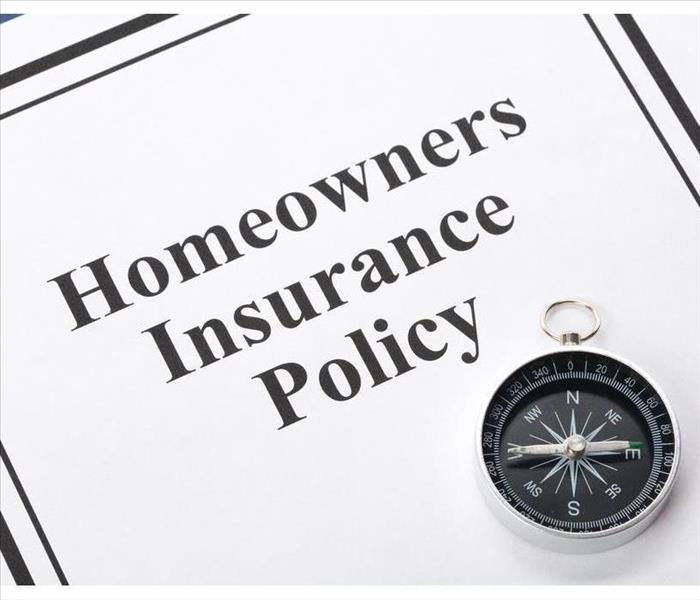 Having a homeowners’ insurance policy is always a good idea.
Having a homeowners’ insurance policy is always a good idea.
Understanding Homeowners' Insurance Coverage for Fire
For many people, a house is the largest investment they’ll ever make. If your home in Jasper, SC, is financed with a mortgage, your lender will require you to carry homeowners’ insurance to protect their investment and yours. A homeowners’ policy protects the structure of your property and your belongings from certainly covered perils including theft or certain disasters, such as a home fire. Even if you don’t have a mortgage, it’s good to have such a plan in place to cover potential damages and losses. You should know that there are certain situations where your policy won’t cover fire damage.
When Is a Home Fire Not Covered?
While policies will vary based on your insurer, geographic locations, and other criteria, most homeowners’ plans won’t cover the following scenarios:
Arson: If you intentionally set a fire to your house, your policy won’t cover your losses or expenses associated with repair and cleanup.
Unoccupied or vacant property: Most policies won’t cover fire damage and other perils for a home that is vacant. You’ll need to purchase a special type of coverage for a vacant home fire.
Act of war: Generally damage that results from acts of war is not covered.
Acts of war are distinct from those of terrorism, which are usually covered by homeowners’ insurance.
What Else Should You Consider?
Where there’s fire, there’s probably smoke. In the aftermath of a home fire, you may also experience smoke damage, soot damage, and damage from the water used to extinguish the blaze. Water damage can also lead to mold, so it’s important to have a professional residential restoration provider complete cleanup and repairs. The pros can restore your home to preloss conditions.
Having a homeowners’ insurance policy is always a good idea, even if it’s not required. It protects you from having to rebuild or restore property damages out of pocket in most cases. It’s incumbent on you to know when you’re covered and when you’re not.
3 Mistakes Homeowners Make After Floods
10/1/2022 (Permalink)
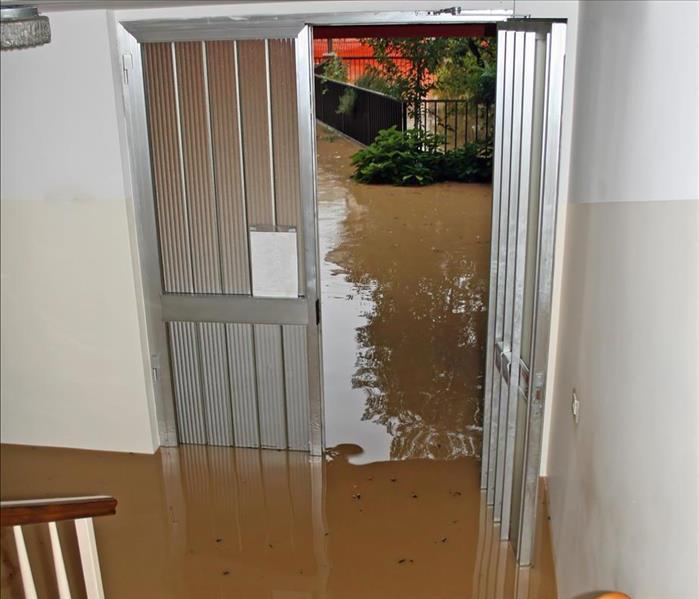 Floodwaters enter a home in Hilton Head, SC.
Floodwaters enter a home in Hilton Head, SC.
The Aftermath Of a Flood
After flood water has filled your home in Hilton Head, SC, you may not know what to do next. There are several common mistakes that homeowners make after their homes are impacted by a flood and knowing how to avoid them can help you get through the aftermath of a flood.
1. Staying in the Home
As waters rise, many people may be tempted to stay in their homes in order to protect what they can. However, staying in a flooded home during and after a flood has occurred can be hazardous for many reasons. If you have any indication that your home may be affected by a flood, leaving your home before the flood occurs is often wise. If a flood occurs with little warning, it’s generally best to leave your home and seek shelter in areas of higher elevation.
2. Wearing Inappropriate Clothes
Returning to your home immediately after a flood can be tempting, but it’s often important to make sure you have the appropriate clothing items and the necessary equipment before entering your home. Heavy boots, thick gloves, and a face mask are often useful to wear when entering a flooded home. Even with the right outfit and equipment, areas, where flood water is present, should generally be avoided since debris in the water could be dangerous and electrical hazards may not be clearly visible.
3. Attempting DIY Repairs
Water damage can impact the structure of your home and can damage many of your belongings. However, if you try to make repairs to your home or try to restore items that have been damaged, you may end up causing further damage. Instead, it can be helpful to call flood restoration professionals who can begin restoration while mitigating the damage that has already occurred.
Knowing how to react when flood water has damaged your home can protect you, your belongings, and your home. After a flood, it’s often best to get out of your home, wear the appropriate clothes and avoid making major repairs on your own.
No Flood Insurance? Here’s What To Do
9/14/2022 (Permalink)
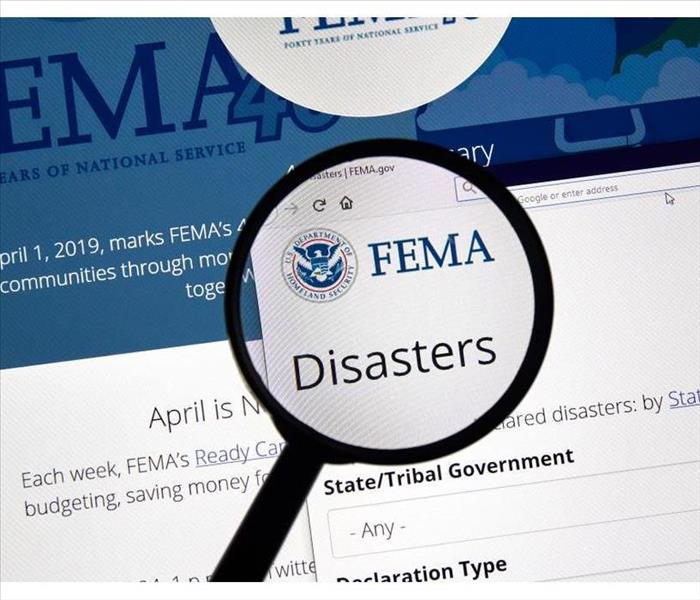 Visit the FEMA website and learn about your coverage options
Visit the FEMA website and learn about your coverage options
Applying for Federal Assistance
Did a devastating flood recently hit your home, and you are left feeling helpless because you do not have flood insurance? Help is available if you lived through a federal disaster. Keep reading for more information on applying for federal assistance.
FEMA Grants
If you live in a disaster-designated county, you may be eligible for this coverage. These grants can help you and your family afford the following expenses:
- Medical and dental care for issues that were caused by the flood
- Home repairs related to the flood
- Underinsured and uninsured loss of personal property
- Funeral expenses necessitated by the flood
- Temporary housing needs
There are other expenses that may be covered as well. If you live near a flood plain and recently experienced a disaster-related to it, it is time to visit www.fema.gov to learn more about the federal flood insurance application process. Be prepared for a federal inspector to visit your property.
Cleanup Assistance
If you need help with water damage in the meantime, a Hilton Head, SC, residential storm damage restoration specialist should be able to help. Most companies have technicians that are used to emergencies of this kind and can quickly set up a cleanup plan that will put your home on the path to recovery. If you are worried about being denied your federal insurance, know that you should still be covered for any damage as long as you take before and after pictures and save your receipts from repair work.
Help Is Available
A flood can be stressful for any homeowner. Not having flood insurance can make such a disaster even more worrisome. The best plan of action after a flood is to visit the FEMA website and learn about your coverage options - and seek professional cleanup assistance from a storm damage company. Help almost always exists after a regional tragedy. You just need to have a plan in place, so you know where to find it.
3 Ways Pretesting Can Help Your Clients After a Disaster
9/1/2022 (Permalink)
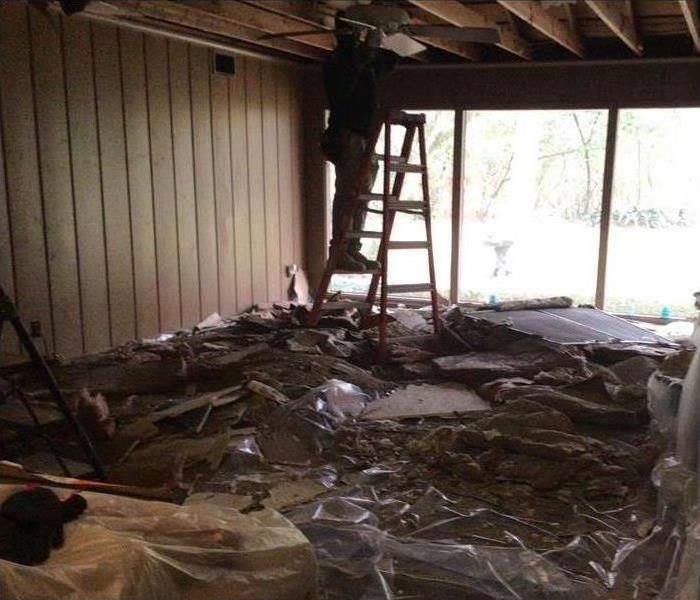 Technicians assess the property for damage and determine a plan of action.
Technicians assess the property for damage and determine a plan of action.
Pretesting After a Disaster: How It Can Benefit Your Clients
After a disaster in South Colleton County, SC, it is the task of the insurance company to help clients as quickly and thoroughly as possible. It is also important to keep costs down where you can. Here are ways pretesting can help you meet those goals for your clients.
1. Determining the Full Extent of Damage
When a professional mitigation service begins the restoration process, the first step is to conduct a thorough inspection. Technicians assess the property for damage and determine a plan of action.
As an example, technicians inspect a home after a flood to locate the source of the water damage. They also determine the level of contamination, if any. They check for safety concerns as well.
2. Assessing What Areas Are Not Damaged
Treating areas that are not damaged can add unnecessary costs to an insurance claim. The restoration company's technicians can look for intact areas and secure them before damage spreads. After a storm blows off part of a warehouse roof, professionals can add tarps to prevent more water and debris from entering the building.
3. Pretesting Materials
Technicians can begin testing materials in the damaged areas to determine whether they can be cleaned. They can also assess which cleaning methods are the best for the situation.
This step is helpful because it saves money if items can be restored instead of replaced. It can potentially protect the client's keepsakes and prized belongings, too. Professionals can then report their findings to the insurance agent. After a fire, for example, cleaning window treatments may remove smoke odor, and they won't need replacing.
SERVPRO believes pretesting is an integral part of a restoration. That is one reason many insurance agencies designate it as a preferred vendor. SERVPRO helps your South Colleton County, SC, clients get back to normal quickly and lower costs.
5 Things To Do When Your Toilet Floods
8/24/2022 (Permalink)
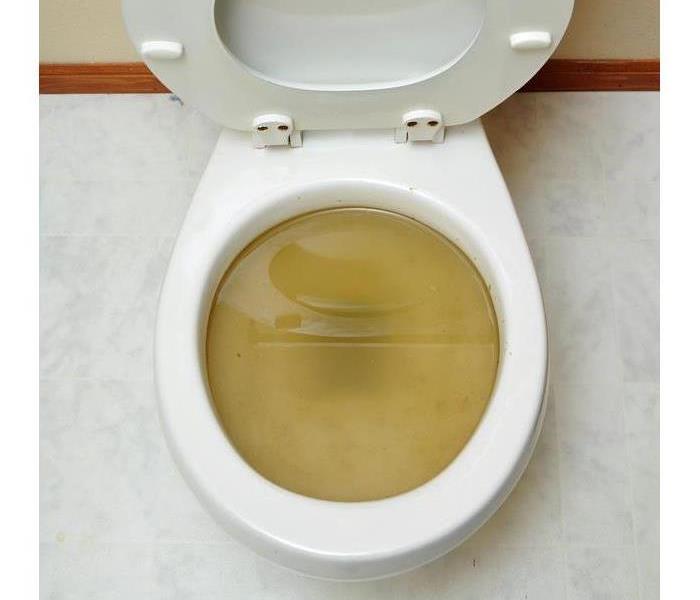 What to do when you have a flooded toilet in your company.
What to do when you have a flooded toilet in your company.
Five Steps to Take If Your Toilet Floods
In Hilton Head, SC, water damage in your business is a vast and costly hassle. Read below to find out what to do when you have a flooded toilet at your company.
1. Call a Professional
Since a toilet problem could be from sewer damage, it may be Category 2 or 3 water. A professional sewage company will assess the situation thoroughly.
2. Ensure Your Safety
Cutting off the electricity can keep you safe. Depending on the size of your property, it may be possible to isolate the shutdown to minimize the disruption to your workflow.
3. Shut Down the Source
If the toilet itself is clogged or malfunctioning, you can turn off the water at the toilet. Try shutting down the primary water source if you cannot get to the bathroom due to the flooding.
Unfortunately, as mentioned above, there may also be possible sewer damage, which means there may not be much you can do on your own.
4. Begin Removing Water
Again, keeping safety in mind, you may be able to get ahead by soaking up excess water using towels or other absorbent materials. However, if the leak occurred on an upper floor, it could be that the water has damaged the subfloor and ceiling below. If so, removing the flooring, ceiling tiles, and anything porous may be necessary before detailed drying can begin.
5. Dry Up the Place
Opening windows or using fans to create airflow is a good start. But, the pros will use industrial-sized dehumidifiers and air movers and check the progression using special sensors until they deem it dry.
When a water disaster disrupts your business in Hilton Head, SC, it is good to consider the possibility of sewer damage and call in the pros to help you get your business back up and running.
How SERVPRO’s Business Model Aids Insurers
8/14/2022 (Permalink)
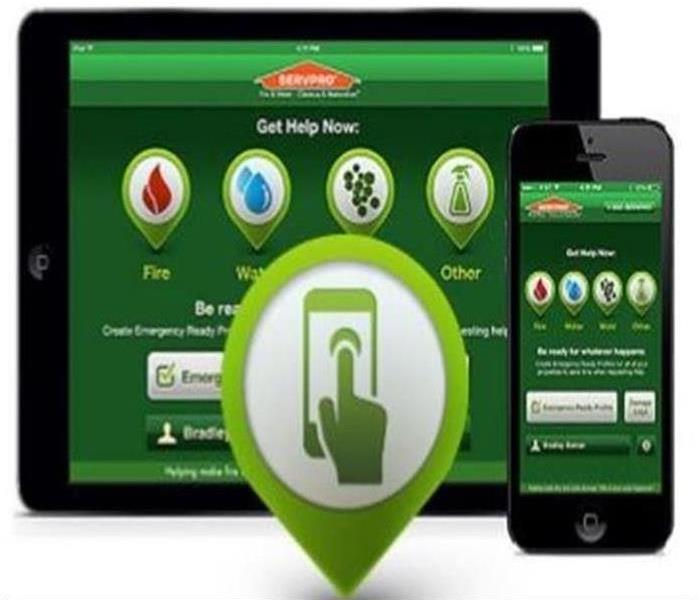 SERVPRO's claims inventory service
SERVPRO's claims inventory service
How the Business Model of SERVPRO Benefits Insurers
When a fire or storm damages a business, there are many working parts that go into fixing it. This process can be daunting for business owners when there is a disconnect between the crew cleaning up and restoring the property and the insurance agent involved. Luckily, the building restoration professionals at SERVPRO set distinct standards to facilitate the process for insurers. Here is a closer look at the benefits of this model should you require these services for a commercial property in South Colleton County, SC.
1. Emergency Response to Every Insurance Claim
The local franchise team selected to repair a damaged property will always provide a fast, emergency response. This gives both building owners and insurance agents alike the peace of mind that the space will be attended to immediately. This way, expediting the claim and restoration process can limit the overall time spent getting the building back to its previous condition, a key factor for any impacted business owner.
2. Pretesting To Reduce Claims Expense
Claims professionals assisting SERVPRO's local franchise in South Colleton County, SC, will carry out pretesting in any damaged property. This practice effectively minimizes the overall insurance claim expense by determining whether the building and its contents should be restored or replaced. Restoration is typically more cost-effective than replacement, so this model can save insurance companies money.
3. An Itemized Claims Inventory Service
Both insurance holders and agents will benefit from the use of SERVPRO's claims inventory service. This advanced system for tracking claims provides an itemized collection of losses within the property and includes photographs of important items. This is key for staying on top of the total loss per insurance claim.
Insurers and their clients will benefit from the fast response, pretesting, and inventory service that SERVPRO's restoration experts provide. These components help expedite the claims process and get damaged properties back to working condition quickly.
3 Common Causes of House Fires and How To Prevent Them
8/1/2022 (Permalink)
 Avoid smoking in your home.
Avoid smoking in your home.
Three Ways To Combat the Most Common Types of House Fires
Knowledge is power when it comes to preventing a home fire. Identifying and addressing common fire causes is a simple way to reduce your risk of catastrophe. Here are three ways to combat the most common types of house fire in Jasper, SC.
1. Stop Smoking Already
One of the easiest — not to mention healthiest — ways to curb your fire risk is to avoid smoking in your home. According to a report from the National Fire Protection Agency, smoking materials accounted for over 17,000 home fires in 2014.
If you must smoke, take it outside, and be sure all materials are fully extinguished before you dispose of them.
2. Recognize That Your Kitchen Is Basically Home Fire Central
Year after year, cooking is the No. 1 cause of fire in the home. If you'd prefer not to follow Thanksgiving dinner with a call to your local fire cleaning and restoration company, take these precautions when you cook:
Don't cook when you're sleepy or intoxicated.
Turn off the stove if you have to leave the kitchen.
Don't leave your home if the oven is on.
Keep flammable materials far from the stovetop.
Set a timer to remind you when food is done.
3. Be Smart About Heating Your Home
Home heating efforts are the second leading cause of household fires, and we're not just talking about rustic but unreliable old wood-burning stoves. Here are five ways to keep safe when temperatures drop:
Keep flammable materials 3 feet away from heat sources such as the fireplace, furnace, or space heaters.
Keep kids and pets at least 3 feet away from fires and space heaters, too.
Regularly inspect your fireplace screen for holes that can allow sparks to escape.
Get your chimney and firebox cleaned annually.
Turn off space heaters before going to sleep
The best way to avoid a home fire is a two-pronged plan that pairs education with prevention. Identifying common causes of residential fire and actively avoiding or undoing them is a simple way to significantly lower your risk of fire in Jasper, SC.
The Problem With Chemical Drain Cleaners
7/26/2022 (Permalink)
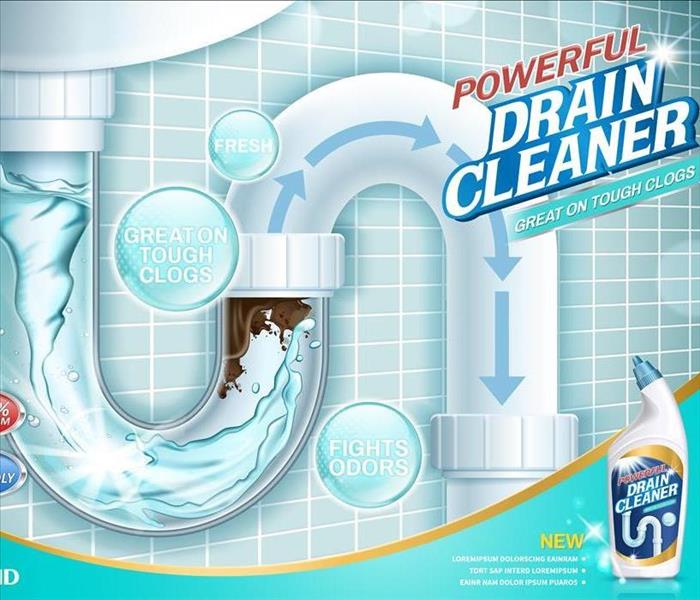 When using chemical drain cleaners you never know what the outcome will be.
When using chemical drain cleaners you never know what the outcome will be.
Chemical Drain Cleaners
It can happen to anyone in Beaufort City, SC. When brushing your teeth or washing your hands, you notice water backing up in the sink, and you find you have a clogged drain. So, what do you do? The ads on most television stations suggest you run to the nearest store and purchase a DYI chemical drain cleaner. However, is that really the best option?
The Biggest Problem
The mixture of chemicals in these cleaners is meant for strong sewage cleaning along pipes that are filled with hair, dirt or everyday miscellaneous buildup. The way to attack all possibilities at once is to produce a high enough heat that it bubbles away the problem by breaking the debris into bits that easily move down the drain. But not all pipes are created equally. Here are some problems you may encounter in your home’s plumbing.
- Fractured pipes caused by the shifting earth
- Aging pipes that have weakened over time
- Incorrectly installed plastic pipes
When the heat and force caused by the chemical interaction in the drain cleaner expand outward, the result can sometimes be disastrous for a home plumbing clogged drain, and that can be the biggest problem of all.
The Best Solution
Calling a water and plumbing specialist is typically the best remedy to a clog in your home’s pipes. The water specialist has many tools the average homeowner does not possess. These tools can help diagnose the issue quickly and efficiently, and let the specialist immediately begin work on removing the problem. Those same tools can help find more serious issues such as tree roots in the line, fragmented plumbing pieces, or badly crushed pipes. Once the issue is found, the specialist can begin making repairs.
Using a chemical cleaning agent on a clogged drain can be like playing Russian roulette – you never know what the outcome will be. Play it safe and avoid the chemicals altogether.
Keeping Your Building's Sprinklers in Top Condition
7/13/2022 (Permalink)
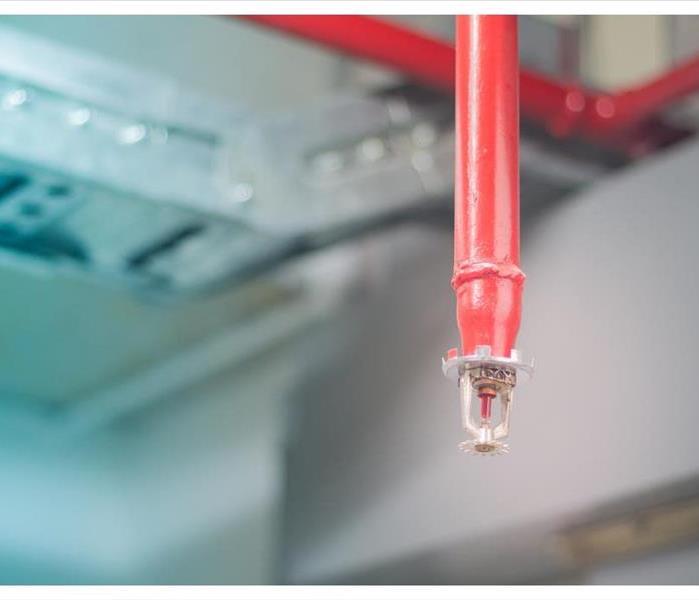 Maintain your fire sprinklers.
Maintain your fire sprinklers.
The Importance of Sprinkler Maintenance
As a building owner in Bluffton, SC, you understand the importance of sprinkler maintenance. Not only is it imperative that your sprinklers correctly switch on when needed but also that they only switch on when needed. The following are tips for keeping your system in top condition:
1. Maintain Your Fire Sprinklers
Sprinkler maintenance is the first step to reliable fire protection. All sprinklers should have a minimum of 18 inches of clearance below them. Once a year, a qualified contractor should inspect the system, including the heads, valves, fire pump (if applicable) and main drain. Every five years, a contractor should conclude an internal inspection, assessing pipes for buildup and debris.
2. Avoid Accidental Activation
Correctly maintaining the system can help avoid accidental activation caused by pipe corrosion or damaged components. However, there are other things to look for regarding sprinkler activation. Circumvent overheating heads by installing them away from stoves and skylights, for example. Vandalism can also be an issue in certain areas. Installing institutional sprinklers that are difficult to access helps dissuade vandals.
3. Educate Your Tenants
It's important that those living or working in the building understand their part in keeping sprinklers in working order and avoiding accidental activation. Inform tenants not to hang anything from heads, such as decorations or clothes hangers. Instruct them not to bump into the sprinklers (cages can be installed to avoid this) or tamper with them. If an issue arises, they should contact building maintenance rather than trying to repair the problem alone. In the event of sprinkler activation, it is always beneficial to contact a certified cleaning and restoration crew.
In the case of commercial fire, everyone hopes that their sprinkler system will perform correctly. In addition, it's essential that sprinklers not be activated unnecessarily, resulting in a hassle for tenants and financial strain for building owners. Sprinkler maintenance can go a long way in ensuring peace of mind for both possible situations.
How Does SERVPRO Help With Claims?
7/4/2022 (Permalink)
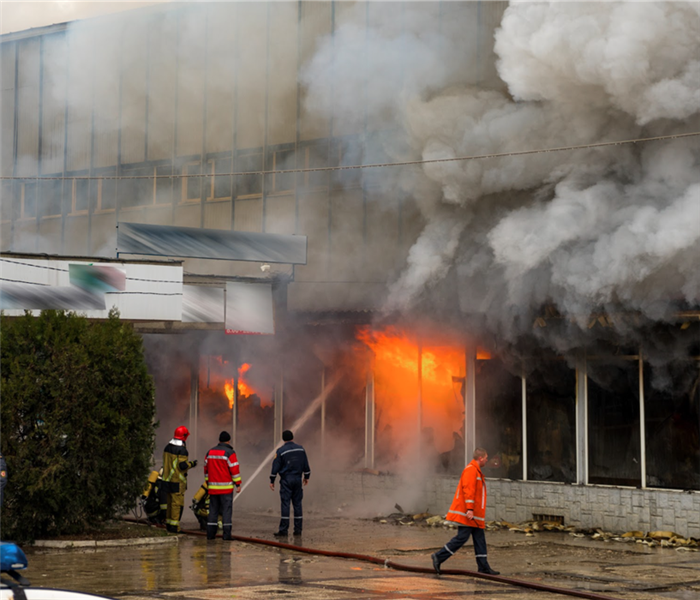 Commercial fire damage in Hilton Head, SC.
Commercial fire damage in Hilton Head, SC.
When your clients in Hilton Head, SC, have suffered property damage due to flood or fire, they expect timely help to get their property restored and their lives back to normal. Insurance adjusters rely on the professional service of their local restoration experts to get the job done.
How Does SERVPRO help with claim services?
Our commitment is to get your clients back to their lives as quickly as possible while minimizing cost and inconvenience.
1. Response Time In the course of emergency response, every moment of delay can allow the water, smoke, or fire to spread to other areas of the property. To minimize damage, you need restoration experts who can be on site quickly and know what to do immediately upon arrival.
We have over 1,900 locations across the US and Canada, and we respond to emergencies 24/7. Our professionals can be on-site in most locations and initiate claim services in a matter of hours.
2. Cost Consciousness Our quick response to your client’s emergency is a significant cost-saver; the less time the damage has to spread through the structure, the better. Limiting the extent of loss reduces the cost of the repair. We also employ pretesting to prevent rebuilding what should be restored instead.
3. Client Satisfaction We work to assure your clients’ satisfaction with every restoration. By maintaining transparent communication throughout the project and only working with quality vendors, we ensure that the job gets done right, with minimal disruption to the client’s life.
4. Professional Service We strive for excellence in every aspect of restoration. Our goal is to provide exceptional claim services to every client. The restoration and repair experts we work with receive state-of-the-art training. They are focused on providing the service and consideration your clients deserve throughout the process.
As an insurance professional, you will receive the support you need to provide your clients with the help that they expect.
4 Step Sewage Damage Cleanup Process
6/27/2022 (Permalink)
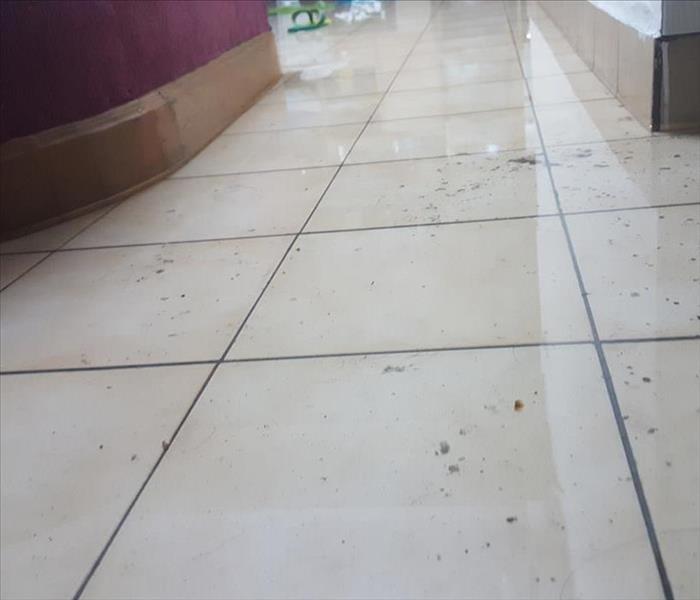 Sewer cleanup is not a fun process.
Sewer cleanup is not a fun process.
Four Steps of Sewage Damage Cleanup
Toilet overflows are fairly common in commercial buildings. The amount of foot traffic businesses see often means restrooms are overworked, at least when compared to residential bathrooms. Still, sewer cleanup is not a fun process, and many business owners might be unfamiliar with the rules of such maintenance tasks. Most water mitigation services in South Colleton County, SC, will suggest property owners hire a professional service, one that understands the four steps of sewage damage cleanup.
1. Begin the Sewer Cleanup
If the sewage damage is a result of a flooded toilet or backed-up drain, the most important step is to start. The faster you can remove sewage from a property, the less severe the damage. The initial cleanup process is similar to other floods. A company might use tools, such as pumps, to remove a majority of the contaminated water and waste. The important thing is to remove the sewage and keep it away from inventory and other elements.
2. Follow State and Local Regulations
Every territory may have different rules and regulations for how to handle a sewer backup. Most business owners are not aware of the specifics of such regulations. Therefore, instead of trying to cram a bunch of laws into your brain, consider hiring a professional service to take on the burden for you. Certified services already have the knowledge required to clean up your property, so let them.
3. Disinfect and Clean the Site
Once the sewage is removed from the facility, the service you hire will disinfect, sanitize, and clean every affected surface. The goal is to leave the property feeling as clean as it was before the disaster.
4. Restore the Property
Finally, the restoration company you bring on will work to repair the facility to "like-new" conditions. Most restoration companies want business owners to feel like a disaster never happened.
Sewer cleanup is not a fun process. You should not attempt a cleanup alone. A mitigation company or emergency plumbing service typically has the knowledge and tools necessary for the job.
Choose the Best Smart Smoke Detector for Your Home
6/21/2022 (Permalink)
 A smart smoke detector protects your property against fire.
A smart smoke detector protects your property against fire.
Select the Most Effective Smart Smoke Detector for Your Residence
A smoke alarm protects against fire danger by emitting a high-pitched noise if it senses smoke. New, smart versions can alert you of smoke even when you aren't home by sending you a phone notification. Here are some criteria to follow when choosing a smart safety device for your Jasper, SC, home.
Review Smart Smoke Detector Tech
There are three types of technology to consider as you search for a smart fire alarm system.
Smart detectors: These sense smoke based on either photoelectric or ionization technology. Both are effective, but ionized detectors tend to give more false alarms. Smart detectors can be battery-operated or connected to a home security system. They also offer automatic sensor tests and the option to silence false alarms.
Smart listeners: These devices plug into outlets and message your phone if a fire alarm goes off. They do not connect to or communicate with detectors. Large homes benefit most from listeners by reducing the need to replace sensors in every room.
Smart batteries: These are used inside a fire detector and notify you by phone if a fire alarm sounds or the battery is running low. You can also use smart batteries to silence false alarms if the detector is solely battery-operated.
Assess Your Budget
A smart smoke alarm usually costs at least $100. House-wide installation of detectors may be the most expensive option, but it also provides extensive long-term protection.
A listener can cost anywhere from $50 to $100, making it less cost-efficient for extensive detector replacement.
Smart batteries are the least expensive technology, ranging between $30 and $40. However, they boast fewer smart applications than detectors and cannot connect to other technology.
Choose Additional Features
Additional features available in a smart smoke alarm can include:
- Carbon monoxide detection
- Motion-sensitive night lights
- Automatic battery checks
- Ability to identify smoke versus steam
New smart technology makes it easier than ever to keep your family and home safe. These criteria will help you choose the best fire safety device to prevent house fires.
Do These 6 Things Before a Large Loss Response Team Arrives
6/7/2022 (Permalink)
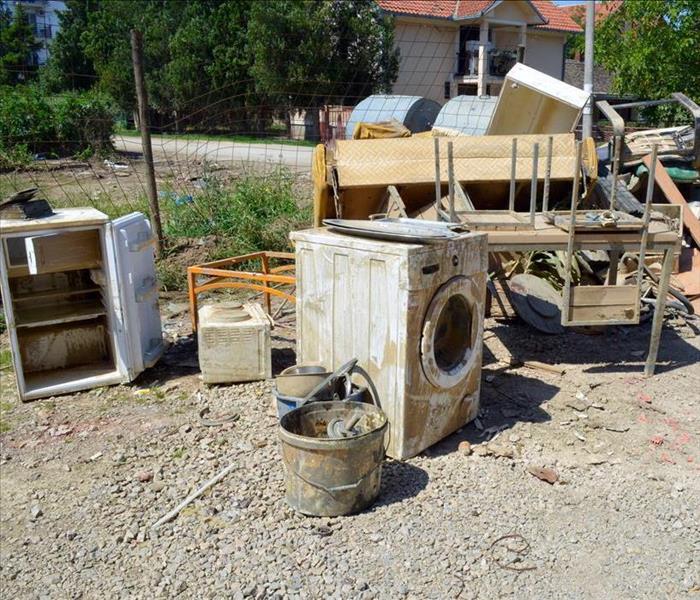 Set out all furniture to dry.
Set out all furniture to dry.
Do These 6 Things Before a Large Loss Response Team Arrives
If your company has faced a catastrophic loss in Beaufort City, SC, from flooding, you need help on a large scale to restore your business to its original state "Like it never even happened." SERVPRO can send Disaster Recovery Teams to assist the SERVPRO Franchise Professionals in your area to help you rebuild faster.
As the water recedes, authorities will give the go-ahead to return to your property. Keep these things in mind while waiting for disaster professionals to arrive.
1. Wear Protective Gear
When entering your property make sure you're wearing sturdy shoes and protective clothing for protection against injury.
2. Keep the Power Off
When you're standing in wet or even damp areas, don't turn on any electrical appliances.
3. Stay Away From Black Water-Contaminated Items After Storm Damage
Water coming from a stream or river as well as a creek is considered black water. The same goes with water that's come through insulation. Stay away from anything that has come into contact with this water after a catastrophic loss.
4. Set Out All Furniture To Dry
Carry out all of your furniture to allow it to dry. Remove all of the cushions and prop them vertically so they can dry out faster. Wipe down any wood surfaces and other items to prevent catastrophic loss from accumulating.
5. Throw Away Contaminated Food
Anything that has come in contact with floodwaters should be thrown away for your own protection, even canned goods.
6. Watch Out for Mold Growth
The collection of moisture in areas such as crawl spaces can encourage mold growth, so be aware and have professionals treat those problem areas right away.
Suffering a loss after a catastrophic event can be devastating, but with the help of a Large Loss Response Team, your business will be good as new.
Reasons To Steer Clear of Flooded Streets
5/27/2022 (Permalink)
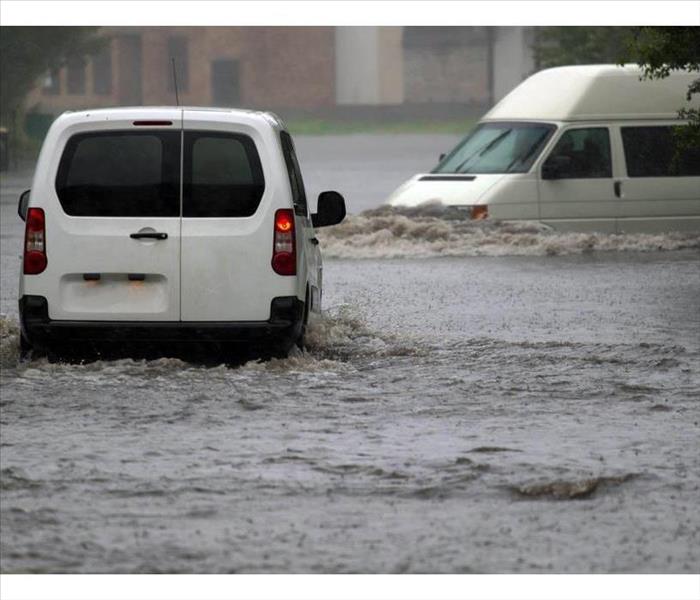 A flooded street may pose more problems to you and your vehicle than you expect.
A flooded street may pose more problems to you and your vehicle than you expect.
Flooded Streets: Why Should You Avoid Them?
Not many people expect rain to impede their daily commute. When there is a flash flood warning in Bluffton, SC, however, you need to be mindful of your usual route to wherever you are trying to go. Driving through a flooded street can have a lot of negative consequences.
Car Damage
Monitor the roads carefully as you plan your route on stormy days. Driving through standing water can cause a lot of damage to your vehicle:
- Rusted parts
- Contaminated fluids
- Electronic shortages
- Hydrolocking
Another problem that flood damage mitigation experts often see is mold damage from floodwaters to the interior of cars. To protect your vehicle, you need to avoid driving through puddles that are so big that you can't see the bottom of them. It's better to take a long way around than put your car in peril.
Obstructed View
It's always important to be able to see where you're going when you drive. The main hazard of a flooded street is that it obstructs your view of what's in front of you. Don't assume that the road is the same as it usually is. Under the water, there may be debris blocking the path, or the asphalt could be broken up, creating dangerous potholes or sinkholes. Find a way around the flooded area.
Travel Tips for General Safety
You don't know how deep the water goes on flooded roads. It's not unusual for cars to be swept away in rushing floodwaters, taking their panicked drivers with them. Even more concerning, you may not be able to escape your car quickly if this happens. To keep control of your vehicle, you need to stay on pavement that you can see. It's better to turn around and go home than take unnecessary risks.
A flooded street may pose more problems to you and your vehicle than you expect. Therefore, it's in your best interest to never drive through standing water on roads.
How To Prevent a Home Flood During Your Vacation
5/17/2022 (Permalink)
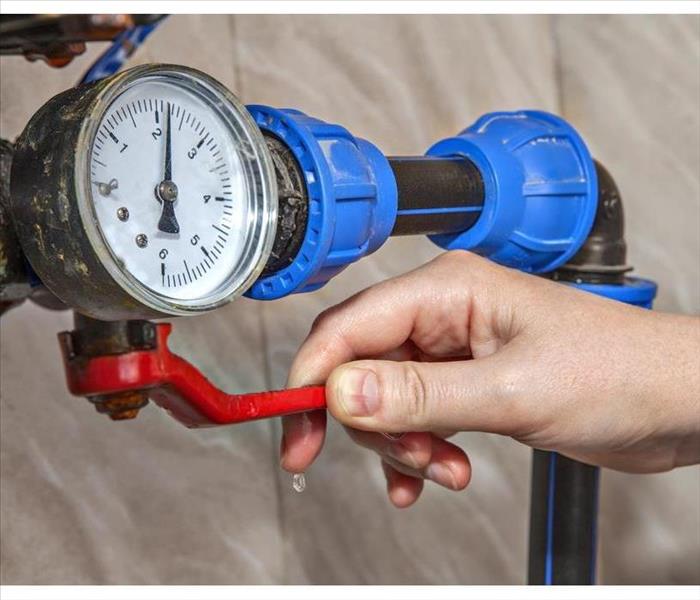 Switch off the main water valve.
Switch off the main water valve.
How To Prevent a Flooded Home
After a long vacation, you will probably need a few days to chill before going back to the reality of long work hours and deadlines. The last thing you want to do is spend the hours after your trip cleaning up a flooded home. Severe water damage can also destroy your valuables and affect the structural integrity of your house. While water pipe repair specialists can help after a disaster, you can limit your stress by preventing damage in the first place. Follow these suggestions, and you should return home to a dry property.
1. Check Fixtures and Appliances
Appliances and fixtures are common causes of leaks. You should thus inspect these parts of your home prior to vacation. If you notice any excess water or hear any funny noises, contact a professional immediately. During your inspection, pay particular attention to:
- Sinks
- Showers
- Refrigerators
- Toilets
- Dishwashers
2. Turn Off the Water
If your house will be empty while you are gone, you should switch off the main water valve. Before you leave for your trip, check the faucets to make sure the water truly is off.
3. Let Your HVAC System Run To Avoid the Need for Water Pipe Repair
Keep your heater or air conditioner running even when everyone is out of the house. This will prevent the buildup of condensation. The continually circulating air should also reduce the chances of your pipes freezing.
4. Consider a Leak Detector
There are several modern devices that can detect a broken pipe or leak in your home. The device will then alert you via phone and may even shut off your water to prevent further harm. You can find one of these devices online or in a home improvement store.
Be sure to inspect your Hilton Head, SC, house and turn off the water lines before leaving for vacation. You can then relax on your trip and not worry about whether you will have to call water pipe repair experts upon your return.
4 Places Mold Might Be Hiding in Your Commercial Building
5/3/2022 (Permalink)
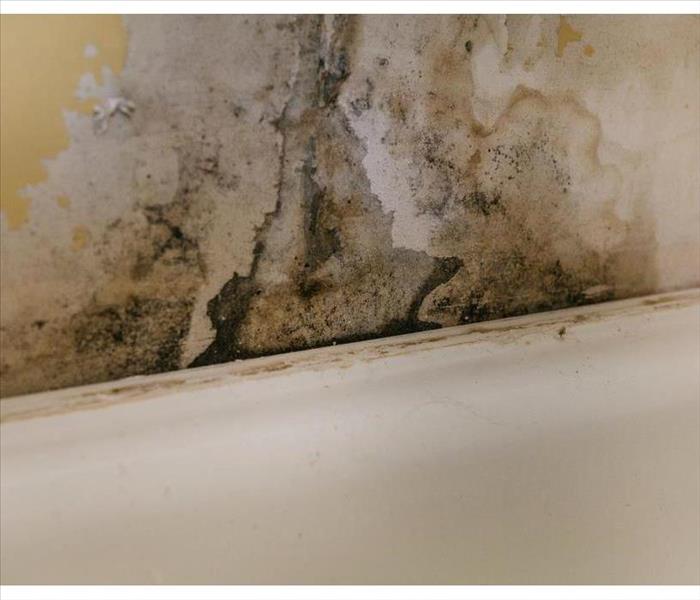 Mold growth on a wall due to humidity.
Mold growth on a wall due to humidity.
Why Do I Keep On Finding Mold?
There are a variety of reasons why you may be finding mold in your Burton, SC, building. Whether the cause is severe weather, plumbing issues, high humidity, or something else, this fungus will take advantage of the moisture. It can grow in nearly any location and may show up in places you might not think to look, including the following.
1. Behind the Walls
Water can sometimes find its way between the walls of your building. This may be the case if you have leaky plumbing or have experienced stormy weather. Mold growth inside walls may show up as discoloration in this area.
2. In HVAC Systems
If you have a heating and cooling system in your building, this can become a breeding ground for mold. Mold spores can gather inside these systems and create an infestation. The moisture present makes it a convenient location for growth.
3. Underneath the Carpet
Absorbent materials such as carpets hold onto moisture from spills or water damage, creating the conditions needed for mold to form. It can be difficult to locate mold in these areas, as it may be growing beneath the carpeting. One sign to be aware of is a persistent musty odor.
4. In the Plumbing
Another place that mold growth can turn up is in the plumbing. Because of the water involved, plumbing fixtures such as toilets, sinks and showers can grow mold if they are not regularly cleaned. Keeping these surfaces dry after use can help prevent this.
When mold forms in hidden spaces such as these, it can be difficult to determine when you have an infestation. If you notice unpleasant odors in the building, mold growth may be the culprit. It can be helpful to have a mold remediation specialist come in to perform an inspection if you are unsure. Reducing moisture levels can help prevent mold and keep it from returning.
Preparing Your Commercial Building for an Upcoming Flood
4/30/2022 (Permalink)
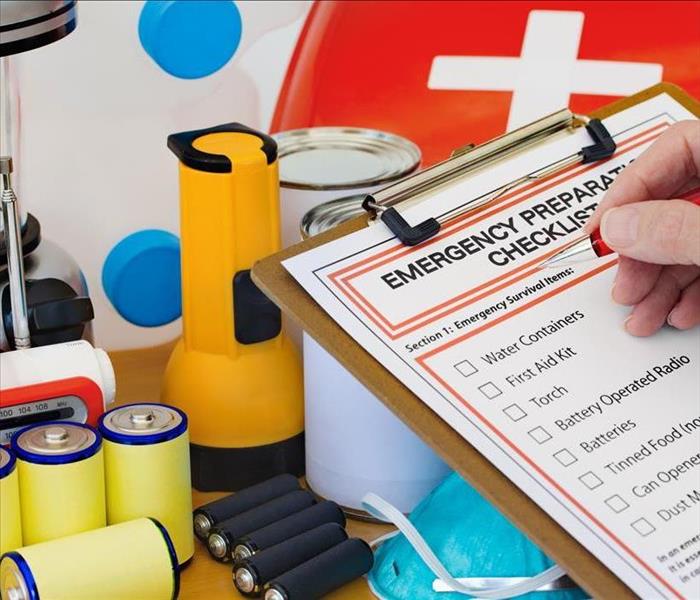 Make sure your property has plenty of food, water, and cleaning supplies.
Make sure your property has plenty of food, water, and cleaning supplies.
Getting Your Commercial Building Ready for a Flood
Since rain occurs in nearly every part of the country, it is perhaps no surprise that floods are the most common type of natural disaster in the United States. However, it is not just heavy rain that causes flooding. This emergency can also result from:
- Storm surges
- Coastal storms
- Dam overflows
- Snow
Flood damage to your Port Royal, SC, commercial building could be quite severe. That is why you should prepare for possible floods well ahead of time. Here are some tips for doing so.
Protect Your Assets
Floods typically affect the lower levels of a property. You should thus elevate valuable items in your building as much as possible. Any key documents should be stored in a waterproof container and placed in a high location. Consider creating backup digital copies of this paperwork, as well.
Get Insurance
You need insurance to help cover the cost of water damage restoration services after a flood. However, a commercial policy does not usually include flooding. Contact the National Flood Insurance Program to buy separate flood coverage.
Purchase Supplies
Make sure your property has plenty of food, water, and cleaning supplies. The latter is particularly important since floods often contain bacteria-heavy black water. The stores may be busy right before the storm when everyone in your area is stocking up on essentials. You should thus purchase what you need well in advance.
Keep Informed
The National Oceanic and Atmosphere Association have a weather radio that provides emergency alerts. Your local community likely has its own warning system, as well. Sign up for these systems so you know the exact nature and timing of the threat in your area.
Do not let severe flooding ruin your commercial property. Store important items away from the floor and purchase insurance that will help you repair or replace any damaged assets. Be sure to gather plenty of supplies and stay informed on the latest weather updates, as well. This should minimize any harm to the premises.
How To Avoid a Candle Fire
4/24/2022 (Permalink)
 There are flameless alternatives, such as battery-operated candles.
There are flameless alternatives, such as battery-operated candles.
A candle fire at your Hilton Head Island, SC, home is a frightening thought, but many people enjoy candles enough to brave the risk. Fortunately, there are many candle alternatives available, and proper safety measures minimize the possibility of fire for those who choose to enjoy traditional candles.
Alternatives to Candles
There are a variety of alternatives that can be used in place of traditional wick candles. The following are some of the most popular:
- Battery-operated candles
- Reed diffusers
- Wax warmers
- Plug-in air fresheners
Flameless candles are good for those who like the visual effect of a traditional candle but want to minimize fire risk. There are flameless alternatives, such as battery-operated Hanukkah menorahs, available for religious purposes. For those who are more interested in the aromatic experience of candles, air fresheners, reed diffusers and wax warmers are good ways to infuse your home with a pleasing fragrance. Remember to keep oils and wax away from children and pets to prevent burns and accidental ingestion.
Safety Measures
Although there are a variety of candle alternatives available, sometimes homeowners want to burn traditional candles. Fortunately, wick candles can be enjoyed safely if adequate precautions are taken. Be sure not to leave the candle unattended or in reach of pets or children. Do not burn the candle near fabrics or anything else that can catch fire. Keep candles a minimum of three inches apart. Have a fire extinguisher and fire blanket nearby, and test your smoke detectors regularly.
Whether you choose to use one of the many candle alternatives on the market today or practice extra caution using wick candles, it is possible to enjoy the ambiance created by candlelight while avoiding a house fire. If your home does suffer damage from a candle fire, an experienced restoration service can provide the tools and expertise needed to get your home back to normal.
3 Steps To Fix a Leaking Kitchen Sink
4/19/2022 (Permalink)
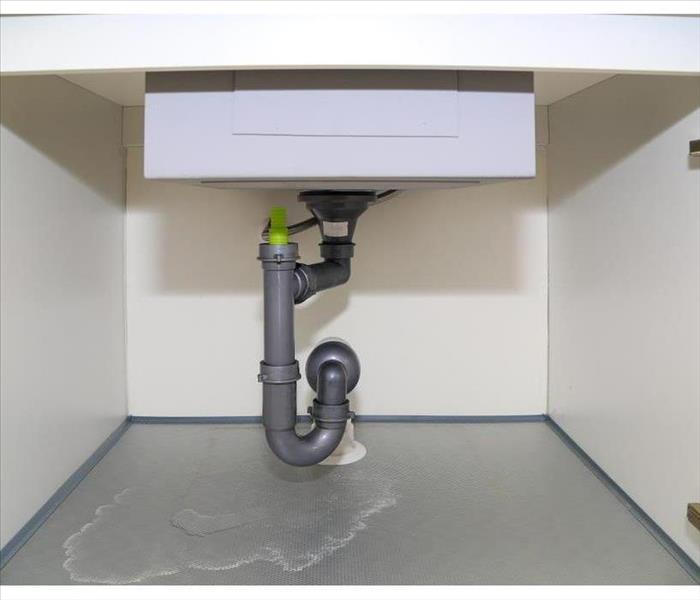 An under sink leak could have serious consequences.
An under sink leak could have serious consequences.
Steps To Fix An Under-Sink Leak
A leaky kitchen sink may seem like a minor issue, but an ongoing leak could have serious consequences. Homeowners or occupants may be able to fix a malfunctioning faucet, drain or drain seal at a residence in Beaufort, SC. A leaking supply line or other plumbing problems that could cause flooding require expert repair. Here are three steps to fix an under-sink leak.
1. Find the Source of a Sink Leak
A leaky or broken water supply line may visibly drip or spray water in a home. A P-trap or sink drain leak may only be evident after the water has run through the sink. If you cannot locate the source of a leak, shut off the water supply and contact a plumber.
2. Fix the Faucet, Drain or Seal
A leaky faucet is relatively easy to replace, along with one or two washers or gaskets. A P-trap leak may require clearing a blockage, tightening connections, or replacing a corroded trap. A sink drain leak may need to be unscrewed and repacked with plumbers putty. A broken supply line is more likely to cause Category One water damage or flooding and require expert repair.
3. Contact a Plumber If a Leak Continues
If the kitchen repair measures you take to stop a leaky sink are not effective, it is a good idea to call a plumber sooner rather than later. The longer an under-sink cabinet or other areas remain wet, the higher the risk of major water damage and mold.
A leaking sink often starts off as a drip, but a problem that goes unaddressed could end up flooding a home kitchen in Beaufort, SC. If you cannot resolve the underlying cause, contact a plumber to minimize primary damage. An under-sink cabinet that has been exposed to water for a long period of time or repeatedly may suffer primary and secondary damage.
 Smoke alarms are a great way to keep your home safe from fire. But, it's important that you know where they should and shouldn't be installed.
Smoke alarms are a great way to keep your home safe from fire. But, it's important that you know where they should and shouldn't be installed.




 24/7 Emergency Service
24/7 Emergency Service






















